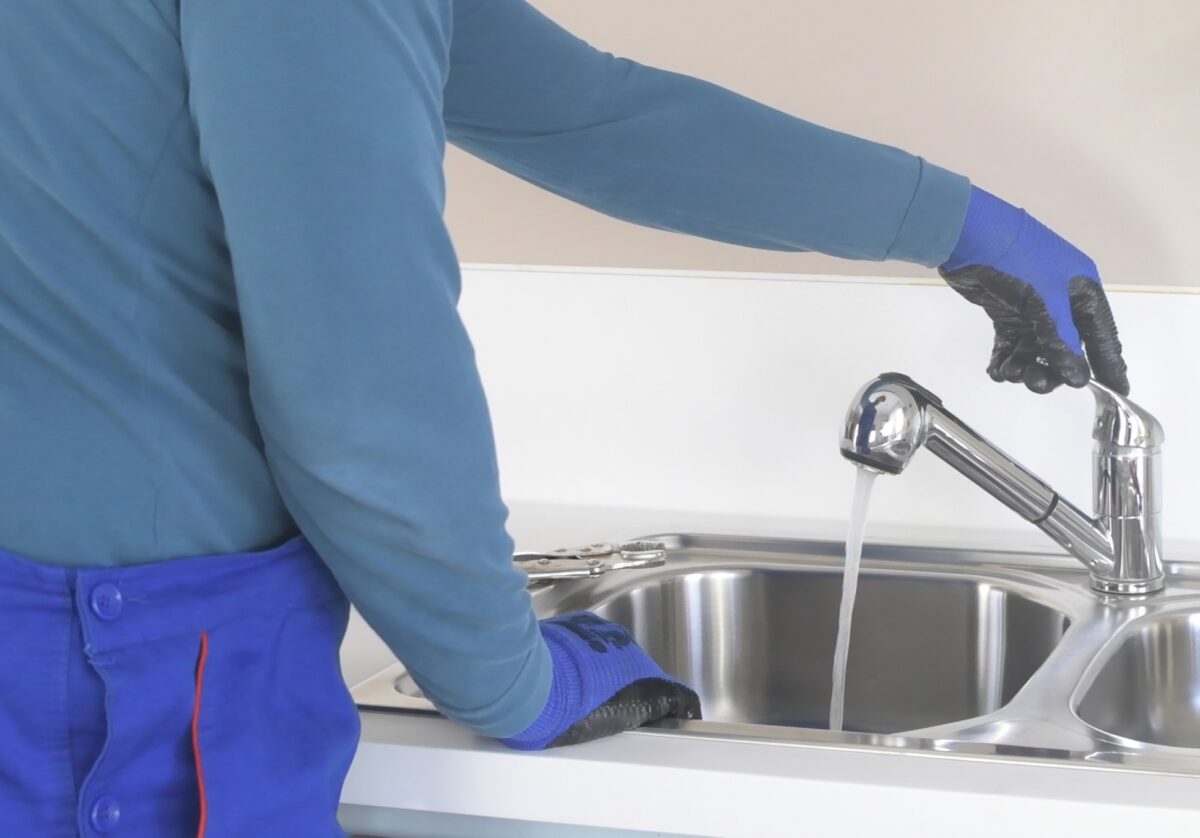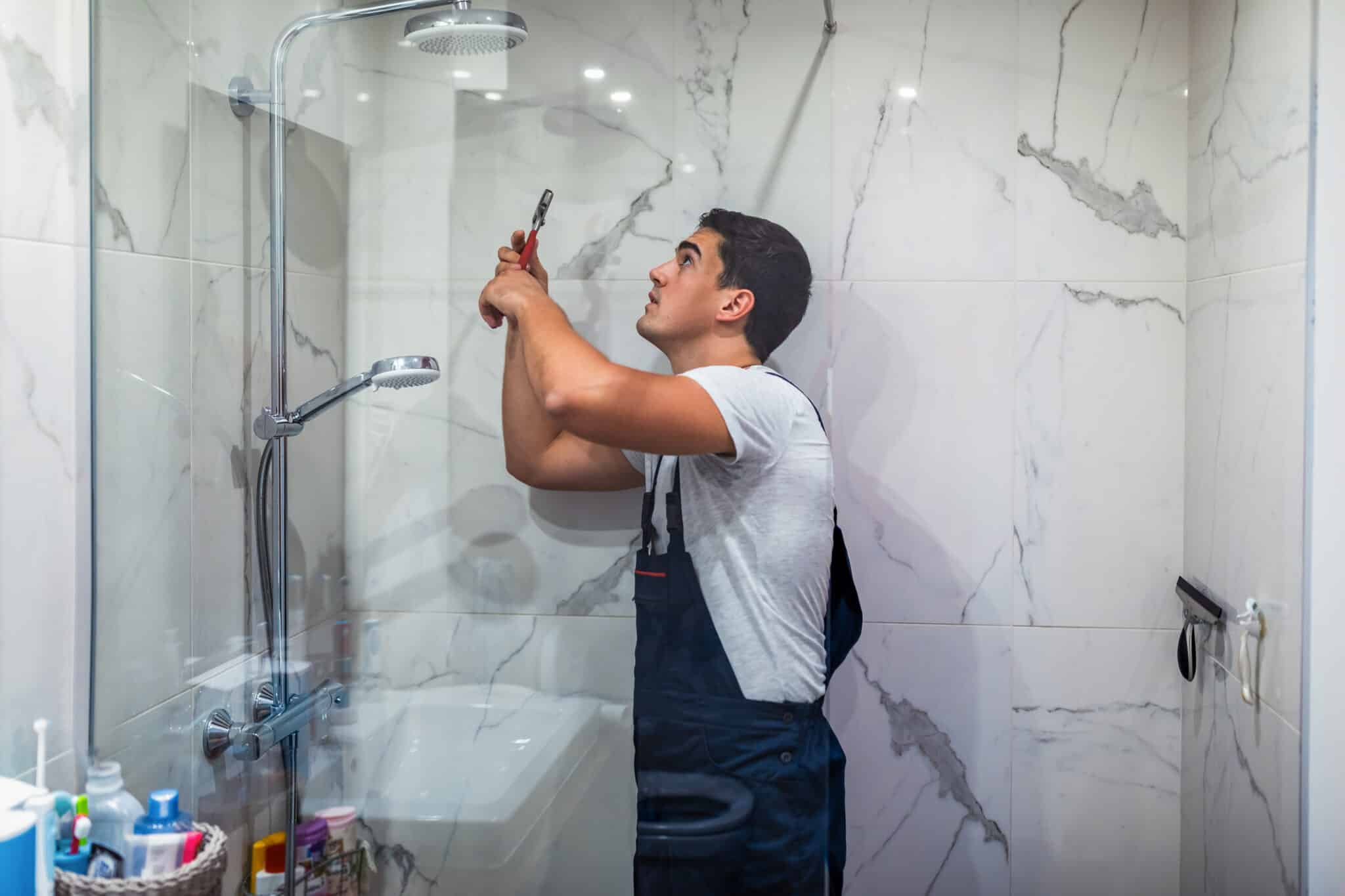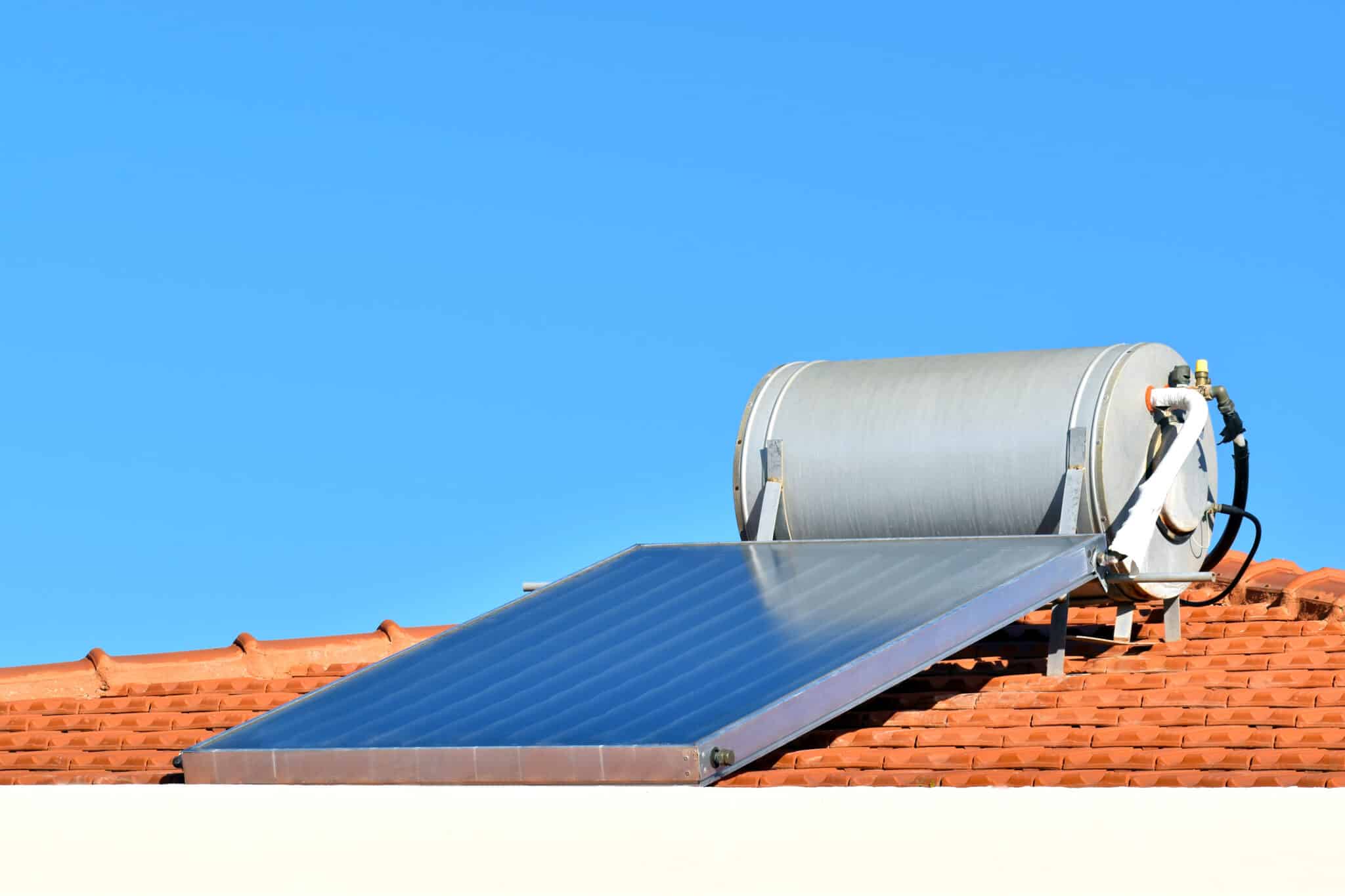Top 10 Eco-Friendly Plumbing Tips for Arizona

- Arizona’s frequent droughts make eco-friendly plumbing essential for conserving water and reducing utility bills.
- Key strategies include fixing leaks promptly, installing low-flow fixtures, and upgrading to dual-flush toilets.
- Rainwater harvesting and greywater recycling are vital for sustainable water use in Arizona’s arid climate.
- Optimizing your water heater and using solar water heating can significantly lower energy consumption.
- Choose sustainable materials like PEX piping and implement drip irrigation systems for an eco-friendly landscape.
- Smart water monitoring systems help track water usage, detect leaks, and prevent water waste, ensuring efficient water management.
Plumbing tips: Have you ever wondered why eco-friendly plumbing is so crucial in Arizona?
With the state’s frequent droughts and scorching climate, conserving water isn’t just a good practice—it’s a necessity.
Arizona faces constant water scarcity, which directly affects its plumbing systems. Droughts can strain water supplies, making it essential to use water wisely at home. When you opt for sustainable plumbing solutions, you’re not only saving water but also reducing utility bills and helping the environment. This makes eco-friendly plumbing a win-win for both homeowners and the planet.
In Arizona, where water conservation is a priority, making the switch to eco-friendly plumbing is not just a trend—it’s a smart investment. Whether you’re installing low-flow fixtures or upgrading to a water-efficient toilet, every small change contributes to a larger goal of sustainability.
Plumbing Tips: Arizona’s Unique Plumbing Challenges
Arizona’s climate presents unique challenges for plumbing systems. The state’s hot, arid environment can lead to issues that homeowners in other regions might never face. Water scarcity is a significant concern, and it’s a problem that affects both the availability of water and the durability of plumbing systems.
Water scarcity in Arizona means that plumbing systems must be designed and maintained with conservation in mind. For example, water pressure can fluctuate more dramatically in areas where water is scarce, leading to increased wear and tear on pipes and fixtures. This can result in leaks and other issues that waste even more water if not promptly addressed.
Another challenge is Arizona’s extreme temperatures. The intense heat can cause pipes, particularly those exposed to the sun, to expand and contract. Over time, this can lead to cracks and leaks. Additionally, the high mineral content in Arizona’s water—often referred to as “hard water”—can cause mineral buildup in pipes, reducing water flow and efficiency. This buildup can also damage appliances like water heaters, increasing energy use and utility bills.
Arizona’s climate also influences how you should maintain your plumbing. Regular inspections for leaks, ensuring proper insulation for exposed pipes, and choosing materials that withstand the heat are crucial steps. For instance, PEX piping is more flexible and resistant to the stress of expansion and contraction, making it a better choice for Arizona homes than traditional copper pipes.
Arizona’s unique climate demands a proactive approach to plumbing maintenance. By understanding these challenges and taking steps to address them, you can ensure your home’s plumbing system remains efficient, durable, and eco-friendly.

Photo from iStock – Credit: RealPeopleGroup
Plumbing Tips: Reduce Water Waste at Home
Reducing water waste in Arizona is vital due to its arid climate. Simple changes can save water and money.
- Fix Leaks Promptly: Small leaks waste gallons of water. Regularly check faucets, showerheads, and toilets. A leaking toilet can waste hundreds of gallons daily. One of the plumbing tips is Fixing leaks immediately, which prevents water loss and lowers bills.
- Install Low-Flow Fixtures: Low-flow faucets, showerheads, and toilets use less water without compromising performance. For example, low-flow showerheads cut water use by up to 50%, and modern toilets use just 1.28 gallons per flush.
- Turn Off Taps: Turn off taps when not in use, like while brushing teeth or washing dishes. This simple habit can save significant water over time.
- Optimize Garden Watering: Water your garden during cooler parts of the day and consider xeriscaping with drought-resistant plants to reduce water use.
Implementing these tips helps conserve water in Arizona.
Plumbing Tips: Upgrade to Water-Efficient Plumbing Fixtures
Upgrading to water-efficient plumbing fixtures is an easy way to conserve water and reduce utility bills in Arizona.
- Eco-Friendly Faucets and Showerheads: Low-flow faucets and showerheads are essential for saving water without sacrificing pressure. Standard showerheads use 2.5 gallons per minute (GPM), but low-flow versions can reduce that to 1.5 GPM. Over time, this saves thousands of gallons annually. One of the innovative plumbing tips is to look for WaterSense-labeled models, which meet EPA water efficiency standards.
- Dual-Flush Toilets: Dual-flush toilets offer two flush options, using less water for liquid waste and more for solid waste. Older toilets can use up to 7 gallons per flush, but dual-flush models typically use just 1.28 gallons for liquid waste. This upgrade can significantly reduce water use and is often eligible for rebates, making it a cost-effective choice in water-scarce Arizona.
Plumbing Tips: Harvesting Rainwater
In Arizona’s arid climate, rainwater harvesting is essential for sustainable water management.
- Setting Up a Rainwater Harvesting System: Installing a rainwater harvesting system is straightforward and impactful. Typically, rainwater is collected from your roof via gutters and directed into storage tanks or barrels. Even a small amount of rainfall can fill large tanks, providing water for non-potable uses like irrigation and flushing toilets. Ensure gutters are clean and properly angled to maximize collection.
- Using Rainwater for Irrigation and Plumbing: Harvested rainwater is ideal for irrigation in Arizona’s dry climate, offering a chemical-free alternative to tap water. It’s also possible to integrate rainwater into your plumbing system for non-potable uses, further reducing reliance on municipal water, especially during dry months.
Rainwater harvesting reduces water waste, lowers utility bills, and provides a reliable water source in Arizona’s challenging environment.
Plumbing Tips: Optimizing Your Water Heater for Efficiency
In Arizona, where temperatures soar, optimizing your water heater for efficiency is essential to reduce energy use and lower utility bills.
- Insulating Your Water Heater and Pipes: One of the innovative plumbing tips is to enhance your water heater’s efficiency by insulating both the heater itself and the surrounding pipes. This insulation reduces heat loss, meaning your water heater doesn’t have to work as hard to maintain the desired temperature. For Arizona homes, where the sun’s heat can affect indoor temperatures, keeping the heat in your water heater where it belongs is key to conserving energy.
- Switching to Tankless Water Heaters: One of the innovative plumbing tips is to consider upgrading to a tankless water heater. Unlike traditional models that constantly heat a large tank of water, tankless systems heat water only when needed. This on-demand heating can save significant energy, especially in a place like Arizona, where reducing energy use is as important as conserving water.
Plumbing Tips: Greywater Recycling: Reusing Water Smartly
Greywater recycling is an effective way to reuse water from your home and conserve resources in Arizona’s dry climate.
- What is Greywater and How to Use It in Arizona: Greywater refers to gently used water from sinks, showers, and washing machines. This water can be reused for non-potable purposes, such as watering your garden or flushing toilets. In Arizona, where water conservation is crucial, recycling greywater can significantly reduce your household’s overall water usage.
- Setting Up a Greywater Recycling System at Home: Installing a greywater system involves diverting wastewater from your home’s plumbing to a holding tank or directly to your garden. These systems can be simple or complex, depending on your needs. In Arizona, where every drop counts, a well-designed greywater system can provide a reliable source of water for outdoor use, reducing your dependence on municipal water supplies.

Photo from iStock – Credit: Maliflower73
Plumbing Tips: Solar Water Heating
Arizona’s abundant sunshine makes solar water heating an ideal eco-friendly solution for your home.
- Benefits of Solar Water Heaters in Arizona: Solar water heaters use the sun’s energy to heat your home’s water, significantly reducing reliance on electricity or gas. In Arizona, where sunlight is plentiful year-round, this system can provide substantial energy savings. Not only does this reduce your utility bills, but it also lowers your carbon footprint, making it a sustainable choice for eco-conscious homeowners.
- Installation Tips and Cost Considerations: Installing a solar water heater requires an upfront investment, but Arizona’s numerous sunny days ensure a quick return on that investment through energy savings. When installing, position the solar panels to maximize sun exposure throughout the day. Additionally, many Arizona homeowners may qualify for state and federal incentives, helping to offset the initial costs of installation.
Plumbing Tips: Eco-Friendly Plumbing Materials to Consider
Choosing eco-friendly plumbing materials is crucial for sustainability and durability in Arizona’s unique climate.
Using Sustainable Materials Like PEX Piping
One of the innovative plumbing tips is to use PEX piping. It is a highly recommended option for eco-friendly plumbing. Unlike traditional copper or PVC pipes, PEX is flexible, resistant to Arizona’s extreme temperatures, and easier to install. It also requires less energy to produce and transport, reducing its overall environmental impact. PEX piping is durable and less prone to leaks, making it a long-lasting and sustainable choice for homeowners.
Avoiding Harmful Chemicals and PVC
Traditional PVC pipes can release harmful chemicals over time, particularly in hot climates like Arizona’s. By opting for alternatives like PEX or other sustainable materials, you reduce the potential for chemical leaching into your water supply. This choice is better for your health and the environment, contributing to a safer, more eco-friendly home plumbing system.
Plumbing Tips: Eco-Friendly Landscape with Efficient Irrigation
Efficient irrigation is key to maintaining a sustainable landscape in Arizona’s dry climate.
Drip Irrigation Systems and Smart Controllers
Drip irrigation systems are perfect for Arizona’s arid environment. These systems deliver water directly to the roots of plants, minimizing evaporation and runoff. Unlike traditional sprinklers, drip systems use less water and provide a more consistent moisture level, promoting healthier plant growth.
One of the innovative plumbing tips is to Pair your drip system with smart controllers which, further enhances water efficiency. These devices adjust watering schedules based on weather conditions, soil moisture, and plant needs, ensuring that your landscape receives just the right amount of water.
Preventing Irrigation Leaks and Water Waste
Regularly inspecting your irrigation system for leaks and blockages is crucial. Even small leaks can waste significant amounts of water over time. Ensuring that your system is well-maintained helps prevent water waste and keeps your garden thriving. Additionally, consider mulching around plants to retain soil moisture and reduce the need for frequent watering.
Plumbing Tips: Smart Water Monitoring Systems
Installing a smart water monitoring system effectively manages water usage and prevents waste in your Arizona home.
Installing Water Meters to Track Usage
Smart water meters provide real-time data on your water usage, allowing you to monitor consumption closely. These systems can identify patterns in water use, helping you understand where and when you’re using the most water. This insight is especially valuable in Arizona, where conserving water is critical. By keeping track of your usage, you can make informed decisions about reducing water consumption and lowering your utility bills.
How Smart Systems Detect Leaks and Save Water
One of the most significant advantages of smart water monitoring systems is their ability to detect leaks early. These systems can alert you to unusual spikes in water usage, which may indicate a hidden leak. Early detection allows you to address the issue before it leads to significant water waste or costly damage. In a state like Arizona, where water conservation is essential, these systems offer peace of mind by helping you maintain an eco-friendly home.
Eco-Friendly Plumbing Tips for Kingman, AZ
Kingman, Arizona, with its unique climate, requires tailored eco-friendly plumbing solutions to conserve water effectively.
Local Water Conservation Regulations and Incentives
Kingman residents should be aware of the local water conservation regulations designed to preserve the area’s limited water resources. These may include restrictions on water usage during certain times of the year, particularly during droughts.
Additionally, Kingman offers incentives for homeowners who invest in water-saving technologies, such as rebates for installing low-flow fixtures or upgrading to water-efficient appliances. Taking advantage of these programs not only helps the environment but also reduces your water bills.
Tailored Plumbing Solutions for Kingman’s Climate
Given Kingman’s hot, dry climate, it’s essential to use plumbing solutions that address specific local challenges. For example, installing drought-resistant landscaping with efficient irrigation systems, like drip irrigation, can significantly reduce outdoor water use.
Investing in high-efficiency fixtures and regularly inspecting your plumbing for leaks can further conserve water. Additionally, consider upgrading to solar water heaters, which are particularly effective in Kingman due to the area’s abundant sunshine.
FAQs about Plumbing Tips
-
What are the best ways to save water in Arizona?
To save water in Arizona, focus on fixing leaks promptly, installing low-flow fixtures, and using smart irrigation systems. Harvesting rainwater and recycling greywater for landscaping are also effective strategies.
-
How does Arizona’s climate affect plumbing systems?
Arizona’s hot, dry climate can cause pipes to expand and contract, leading to cracks and leaks. Hard water is also common, which can cause mineral buildup in pipes and reduce efficiency. Regular maintenance and choosing durable materials like PEX piping can help mitigate these issues.
-
Are there any government incentives for eco-friendly plumbing in Arizona?
Yes, many local governments in Arizona offer rebates and incentives for installing water-efficient fixtures, solar water heaters, and rainwater harvesting systems. Check with your local utility or city government for specific programs available in your area.
-
What is greywater, and how can I use it in Arizona?
Greywater is lightly used water from sources like sinks, showers, and washing machines. In Arizona, you can reuse greywater for irrigation and flushing toilets by setting up a greywater recycling system. This helps conserve water and reduces your household’s overall water use.
-
How do smart water monitoring systems help save water?
Smart water monitoring systems track your water usage in real time, detect leaks early, and provide insights on how to reduce consumption. These systems are especially useful in Arizona, where water conservation is essential.


















